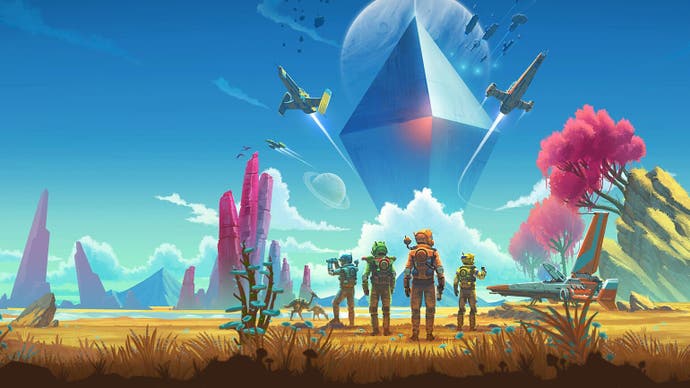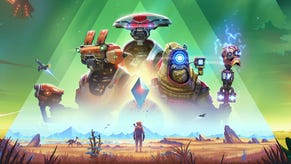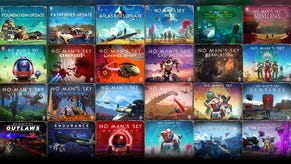The big Sean Murray interview
Hello Games' founder on the remarkable journey of No Man's Sky.
What a trip it's been. Back in 2013, when a little team that was working out of a busted-up old studio they shared with a taxi rank on a small street in Guildford revealed its follow-up to a series of cute cartoon racing games, it was one of those moments. No Man's Sky captured the world's attention like few other games have before it. And for three years No Man's Sky was given the world's stage, making headline appearances at E3 conferences and with creator Sean Murray guesting on big-name US talk shows. "I thought Morgan Freeman was God!" quipped Stephen Colbert as Murray appeared on The Late Show and showed off his procedurally generated universe. "You're actually the second God I've had on the show."
And then, after years of hype, No Man's Sky launched. Some people loved it - us included, who fell a little in love with this flawed but fascinating sci-fi opus. And some people didn't. And some of those people got angry. The weeks following No Man's Sky's launch were a hotbed of controversy and upset, with claims of broken promises - mostly pinned around the suggestion of multiplayer in the run-up to launch - and disappointment that this wasn't the game that some people had in their minds. Things got nasty, and Hello Games retreated into a silence from which they've only just emerged.
And in that time they worked, and worked hard on adding to No Man's Sky, building on those early foundations in league with a dedicated community that has helped Hello Games take its game to some remarkable new places. Big updates followed - the last of which, Atlas Rises, saw some one million people playing on the day of its launch - and then Hello Games went quiet again, working for a year on the most significant update yet, introducing true multiplayer and a whole host of new features that we've run through elsewhere on the site. The reaction has been staggering - Murray uploaded a clip of the game's Discord watching the latest trailer, fans swearily losing their minds at the sheer spectacle of it all. It was like that VGX trailer all over again.
Except this is a different Hello Games now. They're in different offices, for one - in a much less desolate spot in Guildford, and with all the trappings of No Man's Sky's sales success evident in the upmarket furnishings - and talk in slightly more muted tones in their first interactions with the press in two years. I spoke to Murray - as affable, friendly and upbeat as he was last time I spoke to him in the run-up to the game's release - about the remarkable journey he and his studio have been on.
Multiplayer is a big part of this new update. And it was the one big thing that hung over the game around launch. What happened there? People had the impression that multiplayer was going to be in there. Did you lie about it? How did that come about.
Sean Murray: We talked about things during development for four years. We talked about the game way earlier than we should have talked about the game. When we were first talking about it, in the real early days we were talking about - you can see in those early interviews - these aspirations. And then as we moved through development certain things became reality. The classic things - you know this from any developer - that if you're showing things off in a video it's because they exist. And you don't just put that work - we're certainly not organised enough to do that! You're making things, researching things, and we're trying to make this big innovative game with a small team.
And we would go way down some routes sometimes and they wouldn't turn out to be a good idea. Other things we were fighting to get into the game until the last breath, basically. Multiplayer was one of those things. To be super clear - multiplayer at that time was the way we had talked about it. It was something that'd happen to people super infrequently. In play-testing it was of almost no value to the player - it was just a cool thing, a cool moment that some people would have, and we talked about it with the press that there's this cool thing that would maybe make a story sometime. But it's a big complicated thing for that payoff. We were fighting for it until pretty much the final hours of the game.
But it was never that big a part of the game - and if you look at the updates we've done we introduced something in Atlas Rises which was this joint exploration, this light multiplayer, where you had these glowing orbs that you could see and you could create a monument together when you meet up. That's what we were shooting for with release. If you see Atlas Rises, when it came out we had a million people playing on day one. People really liked that update, but they don't talk about that multiplayer. It wasn't that big a deal - annoyingly, because it was a lot of work!
But we always knew that throughout development. I think what people wanted - and the potential that they saw in No Man's Sky was what you've seen [in Next] which totally changes the game. And actually the reason that that's exciting is because of all the features that are supported - like base-building, which was never intended to be put in the original launch. Riding around in vehicles. Owning freighters. Playing the story co-op. Having missions together. None of these things existed, and we've kind of had to build the game out for multiplayer to make sense.
At launch, the number one post on Steam was a petition for us to add multiplayer. There was a whole bunch of people that knew it was never a big part of the game. It was a lonely experience.
Did that early reaction take you by surprise? It was so vitriolic. Could you see it coming?
Sean Murray: At launch - I was saying this earlier - No Man's Sky was a game that we'd been working on, I'd been working on for five years, the team for four years. Average team size of six people - a phenomenally small team - and if you look at the size of the game, I was so proud of what those people had done. That team, it was phenomenal. For loads of people - Eurogamer included! - it resonated. We saw that, especially on launch week, there were loads of positive reviews coming in from The Guardian, The New Yorker, The Atlantic, and games websites as well like GameReactor and stuff like that. And the game was super-polarising - which games normally aren't.
They're not polarising in the same way. We landed on a 70 Metacritic because we were getting 3s and we were getting 9s. The best reviews were saying it's this generation's Elite, it's a masterpiece, it's high art - which I don't entirely agree with - but it was cool, and it was definitely working for some people. And we saw that people were playing for a long time - the average person was playing for a long time - but we were kind of saying (and I am answering your question!) we knew it would be polarising. We were saying before launch that this is a weird game, it's lonely at times, and all the previews - I remember your preview in particular, saying that this is a strange, weird game.
Yeah, that was from the event back in London. The whole thing struck me as strange back then - you were given this big stage, there were chat show appearances, you were the next big thing in games. But it always struck me as strange because it's like putting Captain Blood on an E3 stage. That's a brilliant game, but you just wouldn't do it.
Sean Murray: I'd say that's 100 per cent true, but there's a reason that was happening. And that was because most people are looking for something new in games. I think the average person would look at E3 and say a lot of games, if you were to pull screenshots from them, it might be hard to say which was which. Not for all games, just for some. And No Man's Sky really stood out. It resonated. But it was - what's a good analogy... My favourite film of all-time is 2001. I'm not saying we're 2001! But that film, when I force friends to sit down and watch it and say 'this is amazing', lots of my friends have fallen asleep, walked out, said it was complete rubbish. And at launch 2001 did not review well! But if we were 2001, say, there were some people who might have expected us to be more of a Star Wars experience.
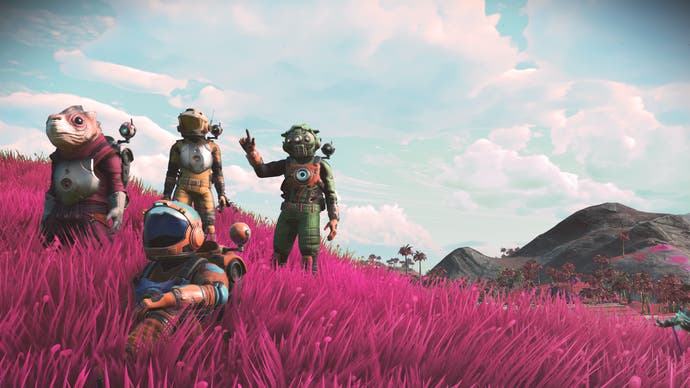
But actually - and I think that's where you're going with the Captain Blood thing - initially I was in that camp. It's this super niche game, people said they wanted it but maybe they didn't. What's been born out in the last two years is this perspective I got when I stepped back from the game after launch. When you start digging into the feedback - it wasn't people saying I hate this game. Most of the feedback was really angry. Where they were angry was that this, for them, was their perfect game. And some part of that was being blocked. They felt passionately about it - when I dug into it, they were saying like this is my perfect game but I hate the inventory system. And I can fix that! And loads of things resonated with me. I was like, I do agree - that was a problem. I'm not saying that we can make the game that everyone loves - but I'd push back on that and say that loads of people could see the potential of No Man's Sky. When you look at Next, I was very happy with the realisation of the vision we had at launch, and this is a much more expanded vision. It's not like this super weird niche thing like Captain Blood. Or maybe it is - but people are into that.
2001 only really came together when Kubrick patched in multiplayer anyway... What was the human cost to what was going on at the time - at the studio and with you.
Sean Murray: We went through.... Well, you can use your imagination. you know what the internet can do. They crowdsource ways to be mean to people. They did all the things they can do. I was dealing with the Met[ropolitan Police], Scotland Yard, stuff like that. It was serious and it was real. I'd say, personally, I wasn't a fan. I think the internet isn't necessarily really good at knowing how to deal with people in the fairest way, I think. They are right in a lot of the mistakes they point out. I looked at a bunch of that stuff and thought, yeah... We talked about the game too early. We were naively excited about the game, and we talked to other people who were naively excited about the game and they interviewed us and we all talked really excitedly! And I will not do that again!
I remember talking to Oli [Welsh, Eurogamer editor], and he was saying something along the lines of how nice it was to sit down with developers and just chat about any old thing, and I was like yeah why doesn't everyone do that? Why don't all publishers do that, why is it so scripted? I totally understand why now. I stepped back and got that perspective. Yes there was a lot of shit going on, but I was able to step back and go okay, I need to reevaluate for a bit about why I make games and who I'm making them for. This didn't just happen in one day. I need to start seeing this as data. And start categorising it and working out what we're doing here. That was my way of dealing with it.
I'll give you an overly honest answer. I've been asked loads of times to talk about dealing with toxicity or a backlash when your game releases because it's become a hot topic, it's happened a whole bunch of times, and I've always turned it down - there are two reasons for that. It's the same reasons I'm giving you a weird answer. One, it's kind of personal. I understand that it's juicy information and it's interesting to hear about. This team that made the game is incredibly talented and they made something that's really interesting - and that [controversy] should not be what defines them, and defines No Man's Sky. No Man's Sky should be the game that was super ambitious and was made by a small team and went on to grow bigger and have a cool community around it. That's what I want to talk about.
The other thing, which is the honest part, the human cost. I don't know how to deal with it. And I've never known how to deal with it. People ask what we did, and I don't think we did anything particularly good or clever. I'm not sure anyone can - an angry mob is crowdsourcing ways to make your life difficult, and they know how to do that. So I did what I did when I was a kid when I was getting shit at school or when I've had shitty bosses. I threw myself into work and made games.
And you didn't walk away from the game.
Sean Murray: Yeah, I mean... I'd love to to take credit for that as some sort of selfless act or whatever, but people don't realise it's easy for that story to run away with itself. I know I'm bias but these facts are pretty much out there - there were stories that there were massive drop-offs of people playing No Man's Sky. I think PC Gamer did this thing where they were comparing our chart with lots of other games, and it's actually normal, and No Man's Sky is doing better than those games. We could see that, we could talk to Valve and to Sony who were super helpful and they were telling us people are playing this game for a phenomenally long amount of time.
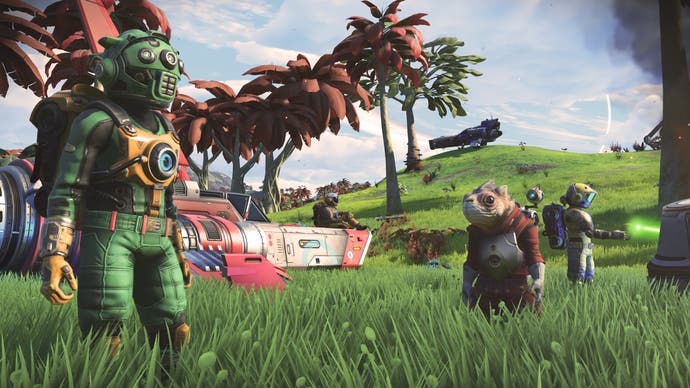
You guys were writing stories about there being massive refund rates, and that's not true - our numbers were slightly above average on PC, but that's par for the course when you have a game that sells a lot of copies and people play it on min spec machines, below min spec machines. They were way under the average on PS4, say - but we had no credibility to come out at the time and say these things. Who would believe us? Probably no-one will believe me now. That's why we were doing updates. We're not doing it altruistically. You can see when our updates come out, we go to the top of the steam charts, our numbers go up the same as it would for any big title. I'm not saying there's no story there - there's definitely problems, there were definitely people who were angry. But you give me too much credit by saying we stuck with the game out of altruism.
Oh the game was clearly a success - I mean look at these new offices! It's just more the fact that it might be tainted by those first few months when everything went to shit.
Sean Murray: It's a thing that a lot of studios are having to deal with over the last couple of years - making a game and releasing it, and dealing with a super-polarised audience, hyper criticism and very very vocal and directly aimed at you personally, not just the company. That's something I'm not a massive fan of, but it's a thing a load of studios are having to deal with. We're one of the few companies that have faced that, and continued. It's really sad that loads of studios, ones you can think of, have often folded the entire studio when met with loads of criticism. Like EA shut down the Mass Effect studio and stuff like that. I really felt for them. Those guys were trying to do procedural planets when we were, we were meeting them at conferences and they were like how are you guys doing this, and they had 300 people working on it! I look at them and think, imagine if they'd been talking about the game that early.
In the past couple of years I've heard of a few high profile games that have come out since, with a similar kind of background to No Man's Sky, and they're saying 'we don't want to do a No Man's Sky', basically. It's become this modern day parable - they saw what happened, and others have learnt from it as well.
Sean Murray: Yeah you see Sea of Thieves come out, and I see a bunch of the reviews mention No Man's Sky but in a positive way. They were like - I'm actually a fan of Sea of Thieves.
Yeah, we liked that one too.
Sean Murray: It got a hard time in a lot of reviews, but a lot of them finished by saying 'let's see if like No Man's Sky they can continue to update it'. I guess we're turning into a more positive story! That would be a nice legacy to leave!
The game we're seeing now, it looks incredible. Is this what you wanted it to be at launch, or is it now more than that.
Sean Murray: Obviously it could never have been that at launch, is the first thing. If we'd have waited to have launched until now... I was going through the feedback on all the updates we've done. The major features are things we've always wanted to add. But a lot of the stuff is coming from the community. We're listening to them - not in a touchy feely way, in a pure stats way. How do we solve this problem they're having - that's our methodology, and has been since launch.
That's our way of focussing ourselves and deciding what to do. The thing I'd say is that at launch we were this weird game where you could be lonely, it was very science fiction. But to me, I am so proud of that game. So proud of the team. They managed to pull it off, and it really did hit the notes that we wanted to hit. On an emotional level, it hit those emotions. The people who did get - when we're reading those reviews from people like Time, The Guardian - Eurogamer!- it was hitting the notes that we'd set out five years ago to do. When we announced, and first showed it at VGX. The thing that people thought - a game where you could have a whole universe and land on a planet and it'll have trees and rocks and creatures, that's impossible. Everyone was like 'it's vapourware'. But that's what we delivered, we delivered on that.
There was a load of details, some big some small, that didn't work out, were dead ends and we showed them off when we shouldn't have. I wish we hadn't done that! But they didn't impact, for me, that core vision. It kills me that people are like 'now it's the game it was supposed to me'. I get what they mean when they say that. You look at the game - even now when I'm looking at multiplayer, with base building, frigates, you must feel this. You think of other ideas. You don't have farming creatures, but it's so obvious and you're like 'that'd be cool!' You can look at it and go those things would be cool. I'm not - just to be super clear - I'm not saying we're going to do those things! We never talk about features beforehand.
Oh no! It's happening again!
Sean Murray: We've learnt our lesson! I'm just saying that it's like we delivered, for me, it delivered on that vision. But you could see how you can expand it, and it can still be true to that. When you see a group of four playing, it still feels sci-fi, it still feels lonely because there's this whole planet and you're this tiny little dot. It's still space, it's still the frontier. The vision hasn't changed - it's just gotten bigger and deeper. I was super happy with the way we delivered on that vision at the start. But there was bags of potential that you could see. You looked at it and thought okay you could play this for 20-30 hours, then you'll move on to the next thing. And you're like 'this could be so much more!' So I understand why people saw it and thought 'this'd be amazing with multiplayer! Why haven't they done that!'
You said the kernel of No Man's Sky was about how you might only have four to five games left and you didn't necessarily want them to be Joe Danger 3 and 4 and 5 and 6. Is No Man's Sky the one game you're going to be dedicating the rest of your career to now?
Sean Murray: Someone was saying to me the other day, that knows me well. When I talk about Joe Danger, I talk about it fondly. And when I talk about No Man's Sky I get all animated and excited and stuff. And that's still true. It's really hard, right, to give you an answer to that. At the moment this is the happiest the studio's ever been. We're really enjoying not talking to the press. We're looking forward to talking more with the community and things like that. We're really enjoying working on the game. It's fun to work on something big and ambitious and to know that people are going to be excited about it.
Something about No Man's Sky seems to get people hyped, we can't seem to stop it - even now when we're being boring and putting out patch notes. People are still excited. It's a real buzz on something like that. We're enjoying it, there are cool things - the reason we called it Next is we want it to be clear this is the next step. There are more steps after that. But I have to be careful. I don't want to be the guy hinting that there are cool crazy features, talking in vaguenesses. I don't want to start hinting that we're going to do a new IP and its crazy and huge. Hello Games, it's just the facts now!
Back in the day it would have been NeoGAF going crazy for a new trailer. You dropped the multiplayer trailer yesterday and there was this big multi-page thread on ResetEra with people getting excited all over again.
Sean Murray: There's that video from the Discord - we were watching along with them, and you get to hear their reactions. It's why you make games. It's exciting. It's so nice - you work so hard on something, and to see people enjoy it. That's all it's about. That's the kind of realisation for us. Why do we make games? It's because we enjoy making them, we're good friends with the people we're making games with. We like making things for people. It sounds basic. At launch there was a realisation that that's why we do it. We were tested on that, but it's like no, it's for these real reasons.
